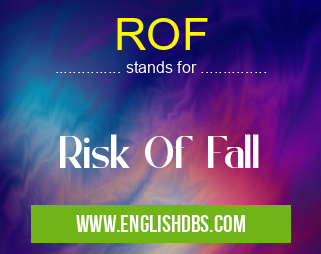What does ROF mean in UNCLASSIFIED
ROF is an abbreviation that stands for Risk Of Fall. It is a term used in healthcare to assess the likelihood of a person falling. ROF is typically used in older adults, as they are more likely to fall and experience serious injuries as a result.

ROF meaning in Unclassified in Miscellaneous
ROF mostly used in an acronym Unclassified in Category Miscellaneous that means Risk Of Fall
Shorthand: ROF,
Full Form: Risk Of Fall
For more information of "Risk Of Fall", see the section below.
Factors that Contribute to ROF
- Age: The risk of falling increases with age.
- Physical Impairments: People with physical impairments, such as balance problems, weakness, or gait disturbances, are more likely to fall.
- Cognitive Impairments: People with cognitive impairments, such as dementia or Alzheimer's disease, are more likely to fall because they may not be aware of their surroundings or have difficulty making decisions.
- Medications: Certain medications, such as sedatives, blood pressure medications, and antidepressants, can increase the risk of falling.
- Environmental Hazards: Hazards in the environment, such as slippery floors, uneven surfaces, and poor lighting, can increase the risk of falling.
Assessment of ROF
Healthcare professionals use various tools to assess ROF, including:
- Physical Examination: This includes evaluating a person's balance, gait, and muscle strength.
- Cognitive Assessment: This includes testing a person's memory, orientation, and problem-solving skills.
- Environmental Assessment: This involves identifying any hazards in the person's environment that could increase the risk of falling.
Prevention of ROF
There are several strategies healthcare professionals can use to prevent ROF, including:
- Exercise: Regular exercise can improve balance, strength, and gait.
- Education: Educating older adults about fall risks and prevention strategies can help them reduce their likelihood of falling.
- Home Modifications: Making modifications to the home environment, such as installing grab bars and removing tripping hazards, can reduce the risk of falling.
- Medication Management: Reviewing medications with a healthcare professional can help identify and adjust medications that may increase the risk of falling.
Essential Questions and Answers on Risk Of Fall in "MISCELLANEOUS»UNFILED"
What is Risk of Fall (ROF)?
Risk of Fall (ROF) refers to the likelihood of an individual falling and sustaining an injury. It is commonly assessed in healthcare settings to identify individuals at high risk of falls and implement preventive measures to mitigate the risk.
Who is at risk of falling?
Individuals at increased risk of falling include:
- Older adults (65 years and older)
- Individuals with impaired mobility or balance
- Patients with neurological conditions (e.g., Parkinson's disease, stroke)
- Individuals with visual impairments
- Those taking certain medications (e.g., sedatives, antidepressants)
- Patients with cognitive impairments (e.g., dementia)
What are the consequences of falls?
Falls can have severe consequences, including:
- Fractures (e.g., hip, wrist)
- Head injuries
- Soft tissue injuries (e.g., sprains, bruises)
- Fear of falling and reduced mobility
- Decreased independence and quality of life
How is ROF assessed?
ROF is typically assessed using screening tools that consider multiple factors, such as:
- History of falls
- Gait and balance impairments
- Cognitive function
- Medication use
- Environmental hazards
What are the interventions to prevent falls?
Interventions to prevent falls include:
- Exercise programs to improve strength and balance
- Home safety assessments and modifications (e.g., removing tripping hazards, installing grab bars)
- Medication reviews
- Patient education and counseling
- Assistive devices (e.g., walkers, canes)
Final Words: ROF is an important concept in healthcare, as falls can have serious consequences for older adults. By assessing ROF and implementing prevention strategies, healthcare professionals can help older adults maintain their independence and safety.
ROF also stands for: |
|
| All stands for ROF |
